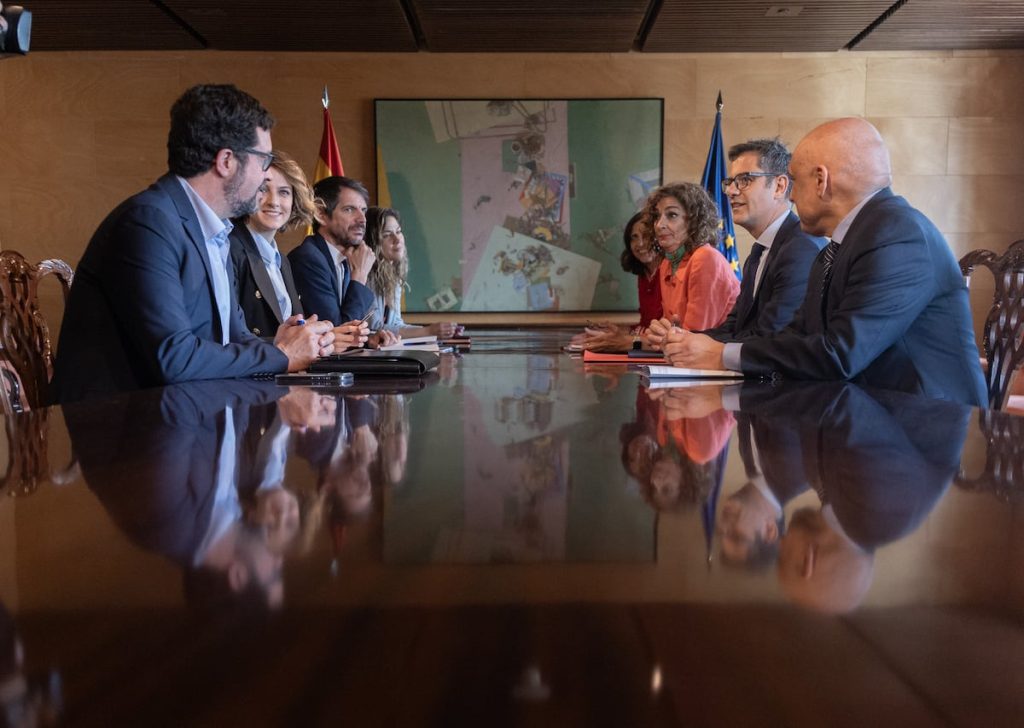The first meeting of the monitoring commission of the coalition agreement between the PSOE and Sumar has agreed to create a working group “consensually between both parties” to develop “measures for democratic regeneration.” This is the main issue that President Pedro Sanchez focused on just two weeks ago when announcing his continuation at the head of the government, with no concrete details yet. Despite recent disagreements within the government, both parties have highlighted in a joint statement “the good health of the coalition” and state that the meeting “has served to promote the fulfillment of the government agreement,” especially in terms of social measures due to the absence of the General State Budgets for 2024, which the PSOE decided not to negotiate due to the Catalan election.
A week before the start of the campaign for the European elections, both parties have also agreed on “the need to recognize the Palestinian State as soon as possible” by Spain and “to promote the necessary measures to end the barbarity committed” in Gaza, where 35,000 Palestinian civilians have died since the Israeli offensive in response to the Hamas terrorist attack on October 7, leaving over 1,200 victims. It is expected that the Council of Ministers will soon recognize the State of Palestine. In addition, Pedro Sanchez will provide explanations to Congress next Wednesday. The meeting, which lasted just under two hours, had been requested by Sumar since February 5, when, during the Galician election campaign, they sent a letter to the PSOE requesting its convocation. The partners have accumulated significant tensions in recent weeks regarding issues such as Palestine, the housing problem, and the renunciation of the Budget.
The main objective of the meeting was to streamline the social agenda that the two government partners signed in their investiture agreement in October. Unlike what happened in the previous legislature between the PSOE and Unidas Podemos, when a similar tool helped resolve some of the most important crises of the coalition—such as those caused by the sexual freedom law or labor reform—the intention now is to make this forum a place to demonstrate joint action and boost government action. After the pause for President Pedro Sanchez to decide whether to continue leading the government a few weeks ago, Sumar has insisted on the “need” to “give content” to that reflection and “advance” the government program as the best way to confront the right-wing parties.
“There was no specific reason for the meeting, it is part of all the monitoring,” said socialist sources familiar with the meeting, which assured that the controversy over the Borkum cargo ship carrying weapons, believed by Sumar and Podemos to be destined for Israel, was not discussed. The PSOE denies it, but despite this, the minority partner of the coalition has decided to go to the prosecutor’s office on Thursday to prevent its docking in Cartagena, scheduled for seven o’clock on Friday morning. The relationship between the two parties has been cooling in recent months, and some discrepancies have become evident. This same Thursday, in fact, different perceptions of how the economy is doing were observed between the PSOE and Sumar.
The PSOE wanted to give full relevance to the meeting, which was attended by some of its heavyweights. Representatives from the main party of the government included the First Vice President and General Secretary of the Socialists, Maria Jesus Montero; the Minister of the Presidency, Felix Bolaños; the spokesperson for the federal leadership, Esther Peña; and Rafael Simancas, Secretary of State for Relations with the Cortes. The Sumar delegation included the party’s spokesperson and Minister of Culture, Ernest Urtasun; the Secretary of State for Employment, Joaquin Perez Rey; the party’s Organization Director, Lara Hernandez; and the Chief of Staff of the Second Vice Presidency of the Government, Virginia Uzal. The two parties have agreed to hold commission meetings every two months, as stated in the joint statement.















